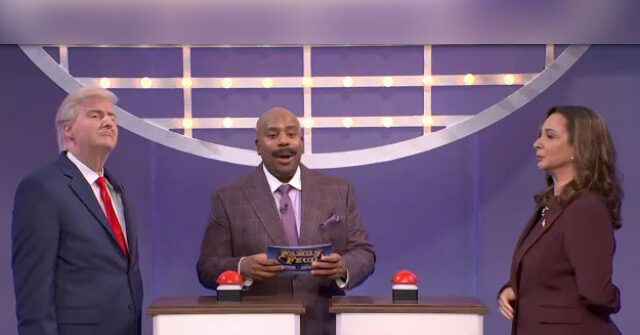Ariana Grande recently made her third appearance as host of the iconic show “Saturday Night Live” (SNL), delivering a nostalgic and comedic performance reminiscent of her previous stints. Reflecting on her earlier hosting experience, she humorously pointed out that her last time on the show coincided with a momentous political event: the election of a potential first female president in 2016. This time, however, she was promoting her role as Glinda in the highly anticipated film adaptation of the musical “Wicked,” a project Grande described as a “dream” for any theater enthusiast like herself. Her embrace of the role not only highlights her theatrical roots but also marks the convergence of her music and acting careers, an ongoing theme in her public persona.
In a departure from her previous hosting gigs, Grande brought a refreshing twist by not performing as the musical guest, a role that went to legendary artist Stevie Nicks instead. Although she promised fans a break from her usual singing showcases, she humorously faltered, singing snippets of a song and echoing impressions of pop icons such as Britney Spears and Miley Cyrus. This lighthearted self-awareness characterized her performance, showcasing her ability to blend humor with her talents. The night’s sketch involving a more extended portrayal of Celine Dion encapsulated this spirit, as Grande navigated her way through comedy and music, balancing both with ease.
The episode’s comedic content was bolstered by a politically charged cold open, featuring Maya Rudolph reprising her role as Vice President Kamala Harris, alongside a host of notable SNL alumni, including Andy Samberg and Dana Carvey. They participated in a parody of “The Family Feud,” which tackled contemporary political issues through satire. The cold open resonated with viewers, especially as it positioned itself within the context of an ongoing election season, a factor contributing to SNL’s ratings resurgence. With the show’s 50th season generating significant viewer interest, every episode has been filled with nostalgic references and clever commentary on the current political landscape, evoking a sense of familiarity among its extensive audience.
During the “Family Feud” sketch, the tableau of political characters played by former cast members effectively critiqued the current state of affairs, while providing much-needed comic relief. Rudolph as Harris commented on her media strategies to engage various demographic groups, emphasizing the importance of voter engagement. Current cast member James Austin Johnson continued to satirize Donald Trump’s persona, adding a layer of humor and social critique that SNL has become renowned for over the decades. This interplay of characters and their comedic delivery reflected the urgency and weight of the political conversations happening outside of the SNL studio, providing their audience not only entertainment but also food for thought.
Stevie Nicks, the evening’s musical guest, captivated the audience with her timeless presence. Opening with her new single “The Lighthouse,” Nicks seamlessly combined her unique style with a nostalgic nod to her past, enchanting viewers with her performance. Her second song, “Edge of Seventeen,” showcased her enduring musical legacy. This diversity in performances serves as a reminder of SNL’s tradition of highlighting both new and established artists, creating a platform for a rich array of talent. Nicks’ return after more than 40 years underscored the show’s commitment to celebrating musical history while also remaining relevant in pop culture.
Looking ahead, SNL’s 50th season continues to promise exciting episodes with notable upcoming hosts and musical acts, such as Michael Keaton and Billie Eilish. Alongside individual episodes, a celebratory primetime special scheduled for February 16 will commemorate the five-decade legacy of the iconic show, reflecting on its influence and evolution. The combination of comedy, music, and political satire has kept SNL at the forefront of American entertainment, with Grande’s recent episode serving as a perfect illustration of its continued relevance in contemporary culture. With each episode, SNL successfully intertwines humor and social commentary, reminding viewers of the power of comedy in navigating the complexities of today’s world.

